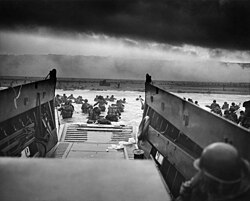D-dagen
Jump to navigation
Jump to search
Norwegian Bokmål[edit]

Etymology[edit]
From English D-Day, where the D refers to the word dag (“day”), from Old Norse dagr (“day”), from Proto-Germanic *dagaz (“day”), from Proto-Indo-European *dʰegʷʰ- (“to burn, to be illuminated”).
Pronunciation[edit]
Proper noun[edit]
D-dagen
- (historical) D-Day (the 6 June 1944, the date during World War II when the Allies invaded western Europe.)
- D-dagen er relatert til andre verdenskrig
- D-Day is related to World War 2
- D-dagen er relatert til andre verdenskrig
See also[edit]
- klokken H (“H-hour”)
Noun[edit]
D-dagen m
References[edit]
Anagrams[edit]
Categories:
- Norwegian Bokmål terms derived from Proto-Indo-European
- Norwegian Bokmål terms derived from the Proto-Indo-European root *dʰegʷʰ-
- Norwegian Bokmål terms borrowed from English
- Norwegian Bokmål terms derived from English
- Norwegian Bokmål terms inherited from Old Norse
- Norwegian Bokmål terms derived from Old Norse
- Norwegian Bokmål terms inherited from Proto-Germanic
- Norwegian Bokmål terms derived from Proto-Germanic
- Norwegian Bokmål terms inherited from Proto-Indo-European
- Norwegian Bokmål terms with IPA pronunciation
- Norwegian Bokmål terms with audio links
- Rhymes:Norwegian Bokmål/ɑːɡn̩
- Norwegian Bokmål terms with homophones
- Norwegian Bokmål lemmas
- Norwegian Bokmål proper nouns
- Norwegian Bokmål multiword terms
- Norwegian Bokmål terms with historical senses
- Norwegian Bokmål non-lemma forms
- Norwegian Bokmål noun forms
- nb:Historical events
- nb:Military
- nb:War
- nb:World War II
